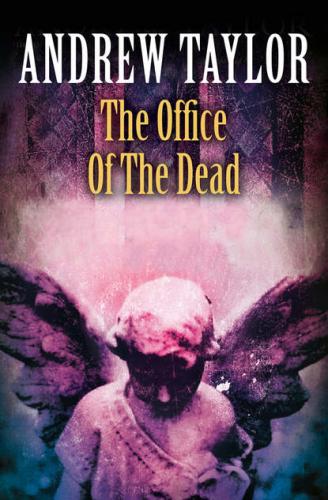ANDREW TAYLOR
THE OFFICE OF THE DEAD
For Vivien, with love and thanks
Contents
Dedication
Part I: The Door in the Wall
1
2
3
4
5
6
7
Part II: The Close
8
9
10
11
12
13
14
15
16
17
18
19
20
21
22
23
24
25
26
27
28
29
30
31
32
33
34
35
36
37
38
39
40
41
42
43
Part III: The Blue Dahlia
44
45
46
47
48
49
About the Author
Author’s Note
Praise
Also by the Author
Copyright
About the Publisher
‘I’m nobody,’ Rosie said.
It was the first thing she said to me. I’d just pushed open the door in the wall and there she was. She wore red sandals and a cotton dress, cream-coloured with tiny blue flowers embroidered on the bodice, and there were blue ribbons in her blonde hair. The ribbons and flowers matched her eyes. She was very tidy, like the garden, like everything that was Janet’s.
I knew she was Rosie because of the snapshots Janet had sent. But I asked her name because that’s what you do when you meet a child, to break the ice. Names matter. Names are hard to forget.
‘Nobody? I’m sure that’s not right.’ I put down the suitcase on the path and crouched to bring my head down to her level. ‘I bet you’re really somebody. Somebody in disguise.’
‘I’m nobody.’ Her face wasn’t impatient, just firm. ‘That’s my name.’
‘Nobody’s called nobody.’
She folded her arms across her chest, making a cross of flesh and bone. ‘I am.’
‘Why?’
‘Because nobody’s perfect.’
She turned and hopped up the path. I straightened up and watched her. Rosie was playing hopscotch but without a stone and with an invisible pattern of her own making. Hop, both legs, hop, both legs. Instead of turning to face me, though, she carried on to the half-glazed door set in the wall of the house. The soles of her sandals slapped on the flagstones like slow applause. Each time she landed, on one foot or two, the jolt ran through her body and sent ripples through her hair.
I felt the stab of envy, almost anger, sharp as John Treevor’s knife. Nobody was beautiful. Oh yes, I thought, nobody’s perfect. Nobody’s the child I always wanted, the child Henry never gave me.
I’d been trying not to think about Henry for days, for weeks. For a moment his face was more vivid than Rosie and the house. I wished I could kill him. I wished I could roll up Henry and everything else that had ever happened to me into a small, dark, hard ball and throw it into the deepest, darkest corner of the Pacific Ocean.
Later, in one of those fragmentary but intense conversations we had when Janet was ill, I tried to explain this to David.
‘Wendy, you can’t hide away from the past,’ he said. ‘You can’t pretend it isn’t there, that it doesn’t matter.’
‘Why not?’ I was a little drunk at the time and I spoke more loudly than I’d planned. ‘If you ask me, there’s something pathetic about people who live in the past. It’s over and done with.’
‘It’s never that. Not until you are. It is you.’
‘Don’t lecture me, David.’ I smiled sweetly at him and blew cigarette smoke into his face. ‘I’m not one of your bloody students.’
But of course he was right. That was one thing that really irritated me about David, that so often he was right. He was such an arrogant bastard that you wanted him to be wrong. And in the end, when he was so terribly wrong, I couldn’t even gloat. I just felt sorry for him. I suppose he wasn’t very good at being right about himself.
Nobody’s perfect.
When I was young, the people around me were proud of their pasts, and proud of the places where they lived.
My parents were born and bred in Bradford. Bradford was superior to all other towns in almost every possible way, from its town hall to its department stores, from its philanthropists to its rain. Similarly, my parents were quietly confident that Yorkshire, God’s Own County, outshone all other counties. We lived in a tree-lined suburb at 93, Harewood Drive, in a semi-detached house with four bedrooms, a Tudor garage and a grandfather clock in the hall.
My father owned a jeweller’s shop in York Street. The business had been established by his father, and he carried it on without enthusiasm. He had two interests in life and both of them were at home – his vegetable garden and my brothers.
Howard and Peter were twins, ten years older
